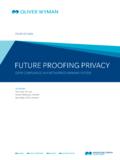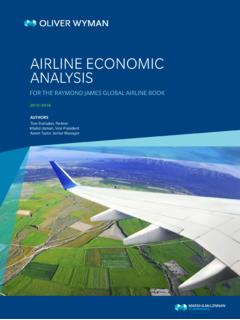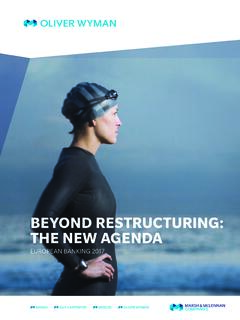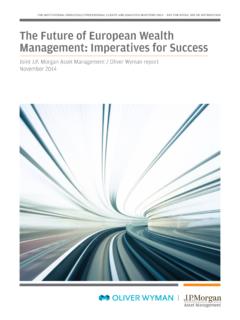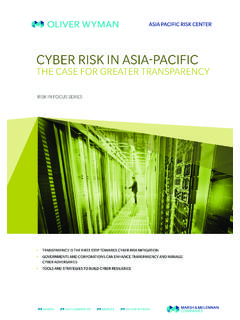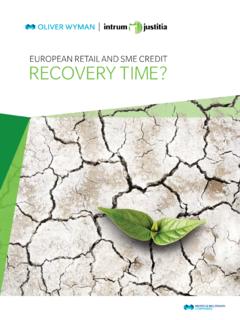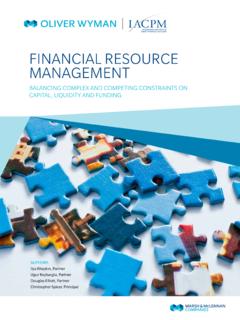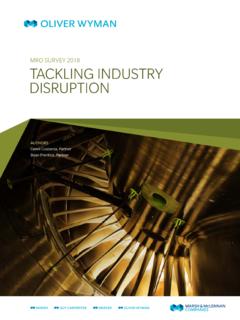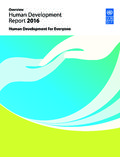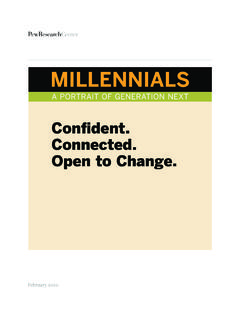Transcription of What role for HR in 2020-2025?
1 what role forHR in 2020-2025? White Paper | February 115/03/2016 11:242 ContentsEditorial 31 Introduction 42 Trends affecting human resources The big generation gap Values and raison d tre: terms of engagement Personal development over title, career, company Employees as customers Agile, flat, open organizations The leadership model is evolving to become a cornerstone 14 of change3 Impact on the role of HR Ensure shared meaning, raison d tre, engagement Manage different worlds and customize the HR value proposition Foster personal development and employability Reinforce the agility and openness of organizations and work practices Develop the managerial leadership model Orange s vision 224 Impact on the posture of HR 235 Impact on the HR community Emergence of new activities Transformation of existing activities Service optimization and digitalization The new role of local HR 215/03/2016 11.
2 243 Editorial The digital revolution ushered in a new world - one that is fast, open, responsive and raises a number of challenges. This change has a direct impact on traditional industries, which are being transformed, altering social relationships and the customer experience. It is true that the stakes are high: in this new digital era, the right information will have to be exploited at the right time and in the right place if the experience the company s customers and staff enjoy is to be fully optimised. The world of work is not immune from this; far from it: faced with the new forms of work that are developing or with the arrival of collaborative working methods in business, what missions will the HR function need to accomplish in order to deliver a true employee experience?
3 The digital revolution is having a very significant impact on us, as HR managers. That is why Orange commissioned this White Paper, which provides analysis aimed at understanding the new challenges to HR from the digital transformation and major societal changes. How are the occupations, skills and stances of HR affected by digital? More broadly, how can HR evolve its responsibilities and strengthen its role as a driver of company transformation, in a way that reconciles the digital and the human?This White Paper was co-authored by Orange s HR teams, Oliver Wyman and Mercer. It includes analyses from interviews with the heads of HR of large French and international firms, leading academics in the fields of management, the humanities and social sciences, and Orange Orange, we have already provided a number of answers to these questions, as part of our Essentials 2020 strategy, which aims to shape a digital and human employer model and delivers an employee experience commensurate with the experience we want for our customers.
4 This vision is based on three main principles: maintaining the balance between economic performance and social performance, achieving a successful employee experience, and ensuring that all employees have an experience tailored to their have also identified three working areas enabling us to put this vision into practice: guaranteeing useful skills for tomorrow, promoting engagement by everyone, and developing new agile ways of working. These three areas are very much in line with what we share in this White Paper, which, I hope, will constitute a pool of ideas that enable us to take our thinking to the next level, and also to help Orange, and other companies, shape their strategy and their transformation of the HR job your reading!Bruno Mettling and J r me Barr 315/03/2016 11:2441.
5 IntroductionPredicting the future has never been easy. Great entrepreneurs and researchers have often been mistaken in their estimates, even if they subsequently made extraordinary Bill Gates, who declared in 1981, No one will ever need more than 637KB of memory on a personal computer. Or Thomas Watson, founder of IBM, declaring in 1943, I think that there is a worldwide market for maybe five computers. Likewise, Stewart Toy wrote in l Expansion in 1972, McDonald s must convince people to eat with their hands while offering a very limited menu. Will this work in France? Probably not. Although it is difficult to predict the future, it is still essential to identify and understand the basic social, economic and technological tendencies or mega-trends that will affect businesses in the next ten to twenty years, in order to anticipate and prepare for the ensuing transformations that will need to take placeA paradox of the long-term thinking is the more you try to imagine the future, the more critical become the tasks of the next twelve months to clarify it.
6 Bill Gates also said, We always overestimate the change that will occur in the next two years, but underestimate what will happen in the next ten. The objective of this white paper is thus to understand the mega trends that will transform the HR function in the next decade in order to deduce how its missions, postures and communities must evolve in report is forward thinking and intended to contribute to the rethinking of HR, but does not pretend to be exhaustive, or provide universal solutions. The aim is rather to launch some ideas to feed the thinking of those responsible for transforming business organizations and who are determined to respect the men and women who compose them as they do white paper is constructed in three parts. Major trends underlying ongoing demographic, technological, sociological and cultural transformations.
7 HR impact in terms of the required demands and transformations of its role, with illustrations by practices already in place at pioneering companies and large corporations. The potential reinvention of HR communities to integrate these trends and their white paper was jointly developed by the HR teams of Orange, Oliver Wyman and Mercer, and specifically integrates about thirty discussions with HR directors from large French and global corporations, universities specialized in social, human and management sciences (see lists in the appendix) as well as Orange warmly thank them all for their precious 415/03/2016 11:2452. Trends affecting human resourcesFor several years now, Oliver Wyman has conducted research on fundamental trends, or Mega-trends that will affect businesses over the next twenty years.
8 By comparing these findings with Mercer s regular studies and the work undertaken for this white paper, we have identified six trends that will affect human resources in the years to .1. The big generation gapThe generation between 20 and 35 years of age, known as generation Y, or the Millennials, will represent half of the workforce by 2020 and three quarters by , companies must understand the specific expectations of the young people composing this new generation: they are committed to companies whose raison d tre they share; they enjoy working in teams, having fun, and communities; they want to play an active role in their own development; they are not loyal and dream of creating their own 1 : The big generation gapGeneration Y-the Millennials-will represent half of the workforce by 2020 and three-quarters by 2025eneration Y the Millennials will represent half of the workforce by 2020 and three-quarters by 2025 Want to be empowered and seek challengeEnjoy teamwork and communities Want continuous feedbackWant to play an active role in their own development; are learning workers Are committed to companies whose raison d tre they shareMix personal and professional life Aren t loyal and dream of creating their own start-upn Empowered to get things donen Appetite for challengen Collaborativen Recognize communities of talentn Expect their managers to give them immediate feedback.
9 Demand feedbackn Want responses or suggestions in every domain (performance, learning, career development, etc.) n Don t understand the concept of career paths/layersn Count on themselves to define their own development pathn Context the value of university degrees and higher educationn See themselves more as learning workers than knowledge workers n Commit to companies whose raison d tre they sharen Aren t satisfied with current compensation models n Don t compartmentalize personal and professional lifen The issue is no longer work-life balance but integrating the two n Most have worked at their current company less than three yearsn Would like to create their own business Source: Oliver Wyman analyses, , BNPP La Grande Invazion, (The Great Invazion) The Boson 515/03/2016 11.
10 24618 -2930-3940-5455+ Recognize their own contributions Development opportunities, recognition, access to mentors Informal workspaces, volunteering opportunities and flexibility Learning opportunities extended outside the company New recruiting approaches Access to social networks and high-tech tools Save for housing Employer recognition of their invidual contributions Career path offering leadership opportunities Work-life balance Flexible schedules Save for their children s education Starting to think about retirement Work hard to be recognized Save for their children s education Planning for retirement Better manage work-life balance Take care of a relative Want that their expertise/experience to be recognized Planning to leave for retirement Expect health coverage to be available on retirement Access to flexible work opportunities, meeting educational, professional.
